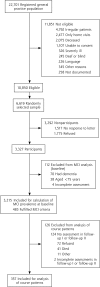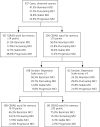Prognosis of mild cognitive impairment in general practice: results of the German AgeCoDe study
- PMID: 24615312
- PMCID: PMC3948763
- DOI: 10.1370/afm.1596
Prognosis of mild cognitive impairment in general practice: results of the German AgeCoDe study
Abstract
Purpose: The concept of mild cognitive impairment (MCI) has recently been introduced into the Diagnostic and Statistical Manual of Mental Disorders, Fifth Edition (DSM-5) as mild neurocognitive disorder, making it a formal diagnosis. We investigated the prognostic value of such a diagnosis and analyzed the determinants of the future course of MCI in the AgeCoDe study (German Study on Ageing, Cognition, and Dementia in Primary Care Patients).
Methods: We recruited 357 patients with MCI aged 75 years or older from primary care practices and conducted follow-up with interviews for 3 years. Depending on the course of impairment over time, the patients were retrospectively split into 4 groups representing remittent, fluctuating, stable, and progressive courses of MCI. We performed ordinal logistic regression analysis and classification and regression tree (CART) analysis.
Results: Overall, 41.5% of the patients had remission of symptoms with normal cognitive function 1.5 and 3 years later, 21.3% showed a fluctuating course, 14.8% had stable symptoms, and 22.4% had progression to dementia. Patients were at higher risk for advancing from one course to the next along this spectrum if they had symptoms of depression, impairment in more than 1 cognitive domain, or more severe cognitive impairment, or were older. The result on a test of the ability to learn and reproduce new material 10 minutes later was the best indicator at baseline for differentiating between remittent and progressive MCI. Symptoms of depression modified the prognosis.
Conclusions: In primary care, about one-quarter of patients with MCI have progression to dementia within the next 3 years. Assessments of memory function and depressive symptoms are helpful in predicting a progressive vs a remittent course. When transferring the concept of MCI into clinical diagnostic algorithms (eg, DSM-5), however, we should not forget that three-quarters of patients with MCI stayed cognitively stable or even improved within 3 years. They should not be alarmed unnecessarily by receiving such a diagnosis.
Keywords: Alzheimer disease; dementia; disease course; mild cognitive impairment; practice-based research; primary care; prognosis.
Figures
References
-
- Winblad B, Palmer K, Kivipelto M, et al. Mild cognitive impairment—beyond controversies, towards a consensus: report of the International Working Group on Mild Cognitive Impairment. J Intern Med. 2004;256(3):240–246 - PubMed
-
- Petersen RCDR, Doody R, Kurz A, et al. Current concepts in mild cognitive impairment. Arch Neurol. 2001;58(12):1985–1992 - PubMed
-
- Petersen RC, Smith GE, Waring SC, Ivnik RJ, Tangalos EG, Kokmen E. Mild cognitive impairment: clinical characterization and outcome. Arch Neurol. 1999;56(3):303–308 - PubMed
Publication types
MeSH terms
LinkOut - more resources
Full Text Sources
Other Literature Sources
Medical



